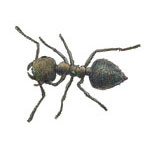READY TO GET STARTED?
REQUEST A FREE ESTIMATE
Fill out the form below or call (888) 466-7849 for a free, no-obligation estimate.

Summer brings hot temperatures and high humidity. It also brings some of the most annoying pests – fleas and ticks. These parasites can cause significant health issues for your pets including Lyme disease, anaplasmosis, and ehrlichiosis. Fleas and ticks are practically impossible to keep at bay and can take weeks to months to get under control. What can you do to protect your pets from these parasites? Check out these 8 tips to prevent fleas and ticks from taking over your pets and your home.
If you suspect a flea or tick problem, call a professional pest control company who can come and thoroughly inspect your home and yard and provide you with a comprehensive treatment and prevention plan.
The spring season is a time when all members of the family, including pets, wander outdoors to enjoy the sunshine and blossoming flowers. Unfortunately, it’s also prime pest season, which means pets are at risk of encountering hungry fleas and ticks that are in search of active hosts. Northwest Exterminating encourages pet owners to take precautions against these dangerous pests during the warmer months.
Fleas are more than just an itchy annoyance. Their saliva can cause anemia, dermatitis and can transfer tapeworms in dogs and cats. Ticks can spread bacteria to pets and cause tick paralysis, which occurs when a female tick attaches near a pet’s spinal cord. This condition can lead to muscle weakness, loss of coordination and in some cases, death from respiratory failure as chest muscles become paralyzed.
In addition to the health threats posed by fleas and ticks, both pests are small in size and extremely mobile, making them difficult to detect and get rid of once inside the home. It’s extremely important for pet owners to be cautious of these pests and contact a licensed pest professional if they suspect an infestation.
The National Pest Management Association, a nonprofit organization committed to the protection of public health, food and property from household pests, offers these tips to keep pets pest-free:
Source: NPMA
PestWorld.org and The Asthma and Allergy Foundation of America have teamed up for a public service announcement to warn homeowner’s of the dangers of allergens in the home caused by pests and rodents. Common household pests such as cockroaches and mice are responsible for inciting allergies and aggravating asthma. In fact, 63% of homes contain cockroach allergens. That number increases to 78%-98% in urban areas. 82% of homes have asthma triggers spread by mice.
Watch NPMA’s public service announcement below:
Keep your family (children are especially at risk) and home safe by keeping your home pest free, call Northwest Exterminating. For more information visit pestworld.org or The Asthma and Allergy Foundation of America.
The NPMA will donate $1 to The AAFA for each new Facebook LIKE (HERE) until Sept, 15th. Go LIKE them…and LIKE Northwest Exterminating (HERE) while you’re there!
PestWorld.org and The Asthma and Allergy Foundation of America have teamed up for a public service announcement to warn homeowner’s of the dangers of allergens in the home caused by pests and rodents. Common household pests such as cockroaches and mice are responsible for inciting allergies and aggravating asthma. In fact, 63% of homes contain cockroach allergens. That number increases to 78%-98% in urban areas. 82% of homes have asthma triggers spread by mice.
Watch NPMA’s public service announcement below:
Keep your family (children are especially at risk) and home safe by keeping your home pest free, call Northwest Exterminating. For more information visit pestworld.org or The Asthma and Allergy Foundation of America.
The NPMA will donate $1 to The AAFA for each new Facebook LIKE (HERE) until Sept, 15th. Go LIKE them…and LIKE Northwest Exterminating (HERE) while you’re there!
SOURCE

This is a question that comes in frequently so we wanted to address it. The cost of NorPest Green pest control is varied depending on the specific needs and issues of you and your home. If you aren’t having specific pest issues and want to keep it that way, the cost of preventative treatments can be given over the phone by one of our customer service representatives. Whether you are having a specific bug issue or looking for preventative measures, a highly trained Northwest Exterminating professional will conduct a FREE inspection of your home. By completing an inspection we are able to conduct a customized program that will meet the pest needs for you and your home.
NorPest Green is a program that was developed by Northwest Exterminating to get rid of bugs and insects while maintaining the lowest environmental impact as possible. The active ingredients are derived from flowers, plants, and natural elements that are friendly to the Earth and your family…pets included. We use a 5 step Integrated Pest Management (IPM) process.
Complete our FREE Inspection Form or call us at 888.466.7849 for a free, no obligation inspection of your home.